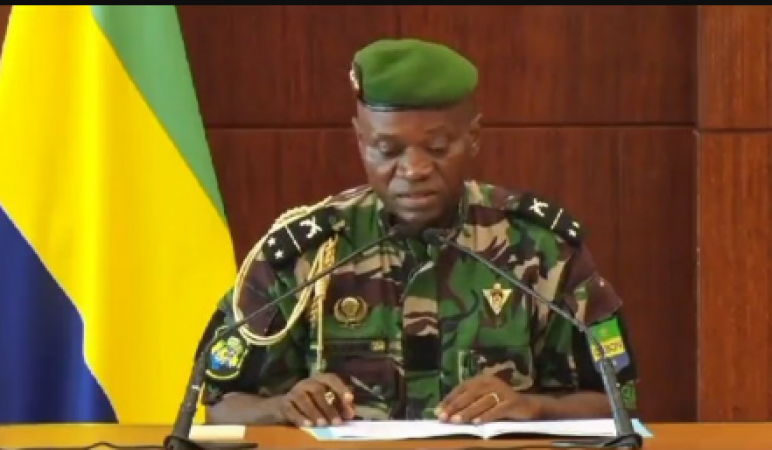
Gabon: In a startling turn of events, General Brice Oligui Nguema, the leader of the coup that ousted President Ali Bongo in Gabon, has announced that he will not rush into holding elections, despite mounting international and domestic pressure. The controversial move has drawn widespread criticism and sparked a political crisis in the country.
General Nguema, who has declared himself the head of state, made his intentions clear during a televised address on Friday. He emphasized his desire to avoid repeating past mistakes in Gabon's political landscape, signaling a cautious approach to the restoration of democracy. The junta led by Nguema aims to proceed "quickly but surely" in its efforts to establish a free and fair electoral system before conducting elections.
However, this decision has not been well-received by the opposition, which has vehemently called for an immediate return to civilian governance. They accuse Nguema of attempting to prolong his own rule and express deep concern over the delay in transferring power back to the people.
Also Read: Remembering Sidharth Shukla: Two Years Since the Loss of a Rising Star
The coup in Gabon has garnered international attention and condemnation from organizations such as the African Union (AU), the United Nations (UN), and the United States. The AU has gone a step further by demanding the immediate release of President Ali Bongo, who is currently under house arrest.
This coup marks yet another chapter in Gabon's turbulent political history. In 2019, the nation experienced a failed coup attempt against President Bongo, adding to the ongoing political instability.
The situation in Gabon remains shrouded in uncertainty. It is unclear how long General Nguema's junta intends to hold power and when elections will ultimately take place. The international community is increasing pressure on Nguema to cede authority to a civilian government and expedite the democratic transition.
In addition to international pressures, the people of Gabon have taken to the streets of Libreville, the capital, to voice their demands. Demonstrators are calling for the immediate release of President Bongo and the swift resignation of the junta, underscoring the nation's yearning for a return to democratic governance.
Also Read: Exploring the World of National Flowers and Flags
The resolution of Gabon's political crisis remains a matter of great intrigue. While General Nguema's decision to delay elections has provoked considerable controversy, it is evident that the international community and Gabonese citizens are closely monitoring developments in the nation.
Gabon, a Central African nation known for its rich biodiversity and relative stability, now finds itself at a crossroads. The coup led by General Nguema has disrupted the nation's political landscape, and the future remains uncertain.
The international community's condemnation of the coup is rooted in its commitment to upholding democratic principles and ensuring that power is transferred through legitimate and transparent means. The African Union, the United Nations, and the United States have all expressed their concern over the situation in Gabon, underscoring the importance of a swift return to democratic governance.
President Ali Bongo, who had been in power since 2009, was ousted from office in a coup that took the nation by surprise. General Nguema's junta swiftly assumed control, plunging Gabon into a period of uncertainty and unrest.
General Nguema's decision to delay elections has been met with skepticism and criticism, particularly from the opposition and civil society. They argue that this delay may allow the junta to consolidate its grip on power, potentially leading to an extended period of military rule.
While General Nguema has expressed his commitment to restoring democracy, his actions are being closely scrutinized. The international community, including regional organizations and global powers, has emphasized the importance of a swift and peaceful transition to civilian rule.
The African Union's demand for the release of President Bongo highlights the broader concern for the rule of law and human rights in Gabon. The detention of the former president raises questions about the junta's treatment of political leaders and the need for a transparent legal process.
Gabonese citizens have also made their voices heard through street protests in Libreville. Their demands for President Bongo's release and the junta's resignation reflect a deep-seated desire for democratic governance. The people of Gabon are determined to ensure that their voices are heard and respected in the nation's political future.
Also Read: Concerns Raised Over Broadness of TRAI's OTT Regulation Consultation Paper
As Gabon grapples with its political crisis, the international community remains vigilant. The world watches closely to see how the situation unfolds and whether General Nguema's junta will heed the calls for a prompt return to civilian rule.
The coup in Gabon, led by General Nguema, has thrust the nation into a period of uncertainty and political turmoil. The delay in holding elections, despite international and domestic pressure, has raised concerns about the junta's intentions and the potential for an extended period of military rule.
The African Union, the United Nations, and the United States have all called for a swift return to democratic governance, emphasizing the importance of upholding democratic principles and human rights. Gabonese citizens, through their protests, also express their determination to reclaim their democracy. The world watches with bated breath as Gabon navigates these challenging times, hoping for a peaceful and democratic resolution to its political crisis.